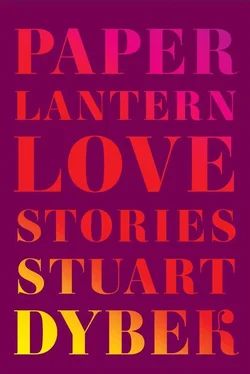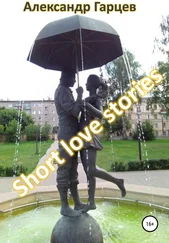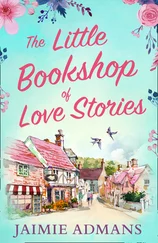After a while he rose, pulled the shades on the windows down, lay back on the bed, closed his eyes, spit into his hand. But it was impossible to touch himself with her sweetness.
* * *
The braided hoops at the ends of pull cords begin to sway like miniature nooses. A tingle of grit on the panes against which the shades nervously rustle. A whoosh of coolness. The shades lift slightly and float back. Hypnotically. Billowy, translucent, like garments through which summer light outlines the shadow of a woman’s body. Until, seized by a sudden gust, they crash like paper cymbals and tread air on the edge of tearing apart. Like trapped birds, they want to fly in this room that once seemed perfectly ordered in its bareness—bed, mirror, chair. Chair on which to drape discarded clothes; mirror in which to watch his hands cupping her breasts.
While on the other side of the door, the girl, who’s changed her name from Mary Jane to Marigold, and who has spied all summer, drawn by the forbidden sounds of her mother’s lovemaking, strains to listen. Now that she no longer has to despise and envy her mother, she’s free. Free to pity her now for the boyfriends she’ll go back to, the guys she brings home rather than hides away with in the unrented flat upstairs, the dorky graybeard, bald under a hat he never removes, six foot two of baby fat singing country western, or Mr. O’Pinions, who thinks he’s cool, calls himself Red Crow, commandeers the TV, and leaves the couch smelling musty. Free to concentrate on her own crush on the guy from Frost’s Service Station. That’s what’s stenciled on the back of his paint-spattered coveralls, the white pair he wears partially unbuttoned over a smooth, bare chest. Rafael stitched in green over the pocket. “Baby” was what her mother called him, behind the closed door, sometimes sighing it over and over. She’s never heard her mother say the real name of the nameless young man with the dark, dreamy eyes, angel eyes, eyes she’s seen on holy cards. Saint Francis eyes, or Saint Sebastian nailed down by arrows but gazing up at heaven. Her saint’s alone in there. Why won’t he come out? she wonders. This time she won’t run and hide. Is he weeping, perhaps, like her clueless mother, her mom who still wants to be a girl, or has he merely fallen asleep?
She holds her breath to listen harder, but all she can hear is the thrash of shades blowing in an echoey room.
There is really only one city for everyone just as there is one major love.
—The Diaries of Dawn Powell: 1931–1965
I read an essay once—I don’t recall who wrote it—about waiting in Hemingway. There’s that couple at the station in “Hills Like White Elephants” waiting for the express from Barcelona, and the little boy with a fever who is waiting to die in “A Day’s Wait.” That situation, waiting to die, is one Hemingway returned to often, as in “The Snows of Kilimanjaro,” when the man with a gangrened leg is recalling his youth in Paris; nor is he waiting alone—the hyenas and vultures are waiting, too. In other stories, the men are alone. Nick Adams waits out the night in “A Way You’ll Never Be.” In “The Gambler, the Nun, and the Radio,” Mr. Frazer listens to a hospital radio that plays only at night—a clever touch—as he waits out the pain of his fractured leg. All these characters have, in one way or another, been wounded.
* * *
When the phenomenon known as the Men’s Movement was in fashion, I was invited to give a poetry reading at a “gathering.” Chad, the therapist who organized the event, believed that poetry had therapeutic power. We’d met at a literary festival in Washington, and it was obvious that Chad, who was shopping a book of his poems, also believed in the power of networking. He referred to poetry as the “Po-Biz.” The term reminds me that, like any troubadour, Orpheus was part hustler, although he couldn’t out-hustle Death. I would have passed on the gathering if Chad hadn’t also invited a friend whom I didn’t get to see often enough, a Vietnamese poet whose family were boat people. After the fact, I learned that my friend accepted the invitation because Chad told him I’d agreed to come.
On the Friday the conference was scheduled to open, with a sweat lodge, I couldn’t get myself to go. I slept restlessly and woke early, feeling guilty enough about reneging to make myself get in my car and start driving. The conference was four hours north of where I was living in Michigan. The Vietnamese poet had flown from Philadelphia to Chicago and then on to a commuter airport in Traverse City the day before. It’s beautiful country up there. Sand dunes sculpt the edge of the planet’s greatest freshwater sea. I had sometimes rented a cottage there on a lake whose name I kept to myself. I’ve read that Michigan has more coastline than any state but Alaska. I don’t know if that calculation includes the coasts of all the weedy lakes and trout streams you can smell hidden in the woods while speeding north on a highway in summer.
By eleven I’d reached the turnoff on Chad’s map and continued down a dirt road. It opened from a papery birch forest into a clearing where a rustic compound stood on the shore of a lake glistening with the rings of feeding fish. I parked and walked by deserted cabins to a log lodge beside the dock. The screen door was ajar, and I went in, past a table stacked with books: Iron John , Fire in the Belly , The Myth of Male Power , Fatherless America. Copies of my book , Welfare , were for sale along with the others and with the three slim volumes by my friend the Vietnamese poet, who was reading to a circle of maybe seventy men. A couple of the men were perched on wheelchairs; the rest sat Indian-style on the plank floor. Each had a drum the size of a toy beside him. My friend was the only one in the circle wearing a shirt.
No one turned when I slipped in; they were absorbed by the poem. My friend had always been a gently charismatic reader, but he was reciting now with an intensity that reflected that of his audience. After each poem there was a collective exhalation, a moment of respectful silence, and then Chad would invite the men to share personal responses. Several of the poems were elegiac portraits of a once-powerful father who had been reduced by immigrant status and the prejudice of his adopted country to an aged, exhausted man on the periphery of all but his family. The men on the floor shared their stories about fathers and Chad would ask my friend to read another poem.
I stood outside the circle, feeling like an unbeliever at a prayer service. I was scheduled to read after lunch and wondered how I would come up with something appropriate. The few vignettes I’d written about my father, also an immigrant, were at best what Chad might term “conflicted.”
My friend read the title poem of his first book, Friendly Fire , an indictment of a criminal American foreign policy simply conveyed in thirty lines about the ghost of his godfather, who had been killed by American fire during the war. When he finished, an older man with a bit of a gut, hirsute, with a silver cast to his ponytail and mustache and a faded SEMPER FI tattoo on his chest, raised his hand and asked, “Chad, would this be the right time to share my ghost dance?”
“Could we put that on hold for just a moment, Pete Red Crow?” Chad said. He passed out a shopping bag stuffed with so-called scarlet ribbons that looked like tie-dyed rags. “I want each of you to take as many ribbons as you need and tie them around the places on your body or spirit that have been wounded.” To demonstrate, Chad wrapped a ribbon around what I presumed was a tennis elbow. Men in the circle were winding them around their heads like headbands, around their necks like bandannas, around their chests, their drooping bellies, their legs, ankles, and feet. Later, when I described the scene to a woman I was seeing, she asked, “Did anyone tie one to his wiener?”
Читать дальше












